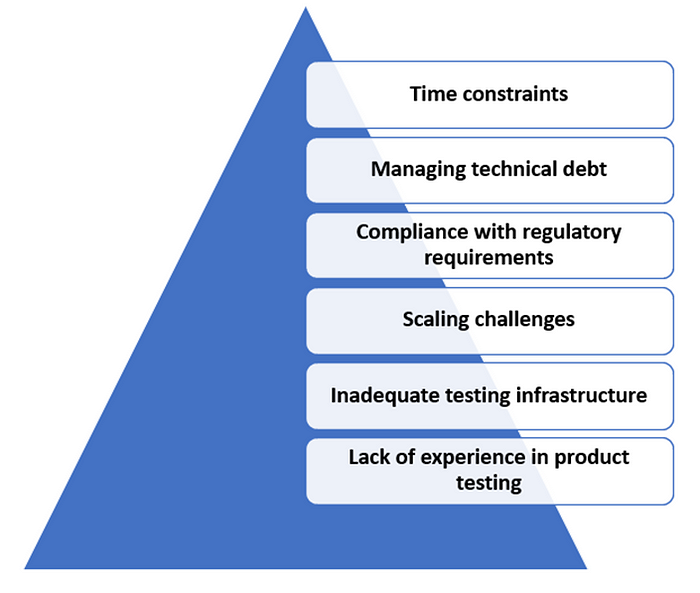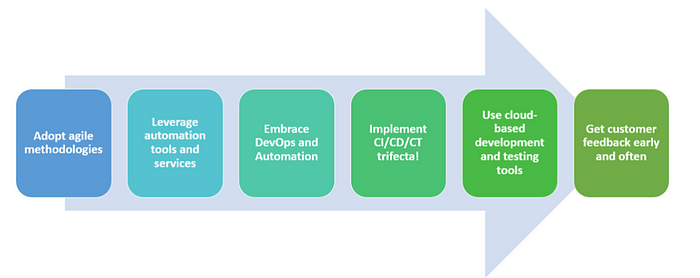6 Proven Strategies to Boost Your Startup’s Time to Market
Starting an entrepreneurial journey is challenging in today’s competitive business environment. Today’s startups face a market of constant instability and disruption due to significant changes in consumer behavior, technological advancements, and intense competition. Hence, they must develop innovative solutions to avoid losing out on revenue and market share to competitors who epitomize agility, creativity, and visionary thinking.
Share this Post to earn Money ( Upto ₹100 per 1000 Views )

Why do startups need faster software development?
Starting an entrepreneurial journey is challenging in today’s competitive business environment. Today’s startups face a market of constant instability and disruption due to significant changes in consumer behavior, technological advancements, and intense competition. Hence, they must develop innovative solutions to avoid losing out on revenue and market share to competitors who epitomize agility, creativity, and visionary thinking.
- A Gartner survey states that 45% of Product Launches Are Delayed by at Least One Month!
- CB Insights found that 70% of upstart tech companies fail
Aren’t these scary finds?
It also makes you wonder why such a high failure rate exists.
Challenges Faced by Startups
Startups must overcome a maze of obstacles to bring their vision to fruition. Since Technology and innovation are constantly evolving, it is much more difficult for startups trying to make their mark.
Let’s look at the top 6 prevalent challenges:

- Time constraints: Startups often operate in a fast-paced environment, where the need to deploy products rapidly can lead to a lack of attention to detail and a rush to meet deadlines.
- Managing technical debt: Technical debt can arise when crucial steps in the software development process, such as testing, are not prioritized, creating a backlog of issues that impede subsequent development efforts.
- Compliance with regulatory requirements: Startups may need to follow several regulatory guidelines depending on their business and maintain the audit artifacts available at all times.
- Scaling challenges: As startups grow, their software development and testing processes need to scale as well.
- Inadequate testing infrastructure: Startups may not have the necessary infrastructure, such as testing environments, test automation tools, and performance testing platforms, to support effective testing.
- Lack of experience in product testing: Many startups do not have dedicated testing resources and access to the latest testing tools and technology innovations. This can lead to inadequate testing, which might eventually cause product failures and customer dissatisfaction.
Automate testing for your web application in THREE days. Start Free Trial Now
6 Strategies for Accelerating Product Releases
Time is of the ultimate essence when it comes to product releases. Embracing speed and time to market becomes not just a strategy, but a vital lifeline for startups daring to disrupt and dominate their respective industries. To stay ahead of the game, they need to find ways to shorten their time to market and speed up product releases.
Let’s look at some methods you adopt to accelerate product releases:

1. Adopt agile methodologies
To launch a high-quality product quickly, startups can adopt agile methodologies like Scrum and Kanban, as they promote iterative and incremental development. By releasing an MVP early on, you can gather feedback from your customers and make changes as needed.
Startups that value adaptability, collaboration, and rapid iteration can expedite their development and testing processes, leading to faster and more successful product launches.
2. Leverage automation tools and services for testing and deployment
Automated deployment tools, such as Docker and Kubernetes, can speed up the deployment process and reduce downtime.
AI-powered automated testing services like Webomates can help startups detect bugs and other issues more quickly. As a result, you can concentrate more on what truly matters — creating fantastic products and growing your business — and spend less time debugging.
Know more about the importance of defect triaging here: Defect triage: The catalyst in bug resolution process
3. Embrace DevOps and Automation
As speed and efficiency are more important than ever, today’s savvy startups are turning to DevOps and automation to accelerate their development processes and gain a competitive edge.
By embracing DevOps practices, you can remove silos, enhance communication, streamline development, and quicken product releases. However, DevOps is more than just collaboration — it’s also about automation. By automating tasks such as testing, building, and deploying code changes, startups can prioritize mission-critical items.
4. Implement Continuous Integration (CI), Continuous Delivery (CD), and Continuous Testing (CT) trifecta!
For startups aiming to accelerate their code release and automate their entire development lifecycle, the combination of CI/CD/CTis the ultimate game-changer.
CI focuses on automated and shift-left testing to improve code integration and catch potential defects early in the development stage.
CD streamlines code delivery by deploying changes to testing and/or production environments after the build stage. However, it’s not enough to stop there.
CT automates testing with every developer commit, ensuring early bug detection and rectification, thus minimizing the risk of expensive errors later on.
5. Use cloud-based development and testing tools
Cloud-based development tools, such as AWS and Azure, can help startups shift their focus to development and testing, rather than managing hardware and infrastructure.
To prevent configuration drift and errors that can occur after a release, startups can adopt an Infrastructure as Code approach that is version-controlled, ensuring that the development, testing, and production environments are identical.
6. Get customer feedback early and often
Rather than spending months building a product that the customers may not like, startups should seek customer feedback from the beginning and integrate it into their product development process.
This accelerates product development, allowing startups to release updated and enhanced features, functionality, and user experience.
Read next
Continuous testing tools in DevOps














